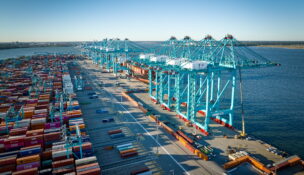
Four ship-to-shore container cranes the Port of Virginia put into service at Virginia International Gateway in April 2025. The port will complete its $450 million dredging project next month, delivering the deepest shipping channels on the East Coast. Photo courtesy Virginia Port Authority

Four ship-to-shore container cranes the Port of Virginia put into service at Virginia International Gateway in April 2025. The port will complete its $450 million dredging project next month, delivering the deepest shipping channels on the East Coast. Photo courtesy Virginia Port Authority
Port of Virginia nears finish of $450M dredging project
Summary
- Port to reach 55 feet depth, becoming East Coast’s deepest harbor
- Widening completed in February 2024 for dual ultra-large vessels
- $83M rail expansion at NIT doubles portwide capacity to 2M lifts
Seven years after the Port of Virginia launched a $450 million dredging project to become the deepest and widest harbor on the East Coast, the massive endeavor will be completed by the end of this year as the shipping channels are dredged to 55 feet deep.
The port, which is coming off two consecutive years as the fastest-growing American port, completed the widening portion of the project in February 2024.
With the widening, two ultra-large container vessels, each capable of carrying more than 20,000 20-foot equivalent units (TEUs), can safely move through the channel simultaneously.
“It’s a big step forward in efficiency,” says port spokesperson Joe Harris. He adds that the port serves the largest vessels in the Atlantic trade. “We’ve seen vessels up against 18,000 TEUs. A deeper and wider channel keeps the flow of cargo coming into and out of the port and reduces downtime.”
The project is just one way the port is improving efficiency and increasing capacity. In August 2024, the port completed an $83 million expansion of Norfolk International Terminals‘ central railyard to accommodate 1.1 million rail TEUs annually. “It doubled the rail footprint at NIT,” Harris adds. “We can now handle, portwide, 2 million rail lifts per year.”
In addition, the first phase of a $650 million modernization expansion of NIT’s north terminal is expected to be completed in October. The project will create capacity for an additional 1.4 million TEUs with the installation of four new electric ship-to-shore cranes, bringing the port’s complement of ship-to-shore cranes to 33, including four replacement cranes that went into service at Virginia International Gateway in April.
NIT’s container stack yard also will be reconfigured, supported by semiautomated stacking cranes. When the project is finished in summer 2027, NIT will have capacity of 3.6 million TEUs, while the port overall will have a total capacity of 5.8 million TEUs.
In March, the port concluded the $220 million transformation of Portsmouth Marine Terminal into an offshore wind energy hub to support Dominion Energy’s Coastal Virginia Offshore Wind Project, as well as similar projects that could be built along the East Coast. Dominion Energy leases 72 acres of PMT for staging and preassembly of CVOW components.
“We’re in a very good position,” Harris says. “Our efficiency continues to improve and sets us up for the future.”
s
















